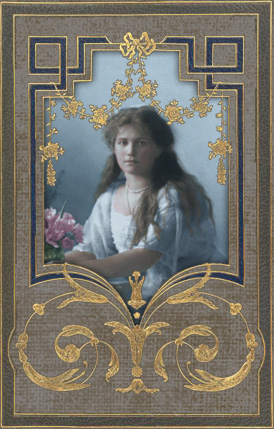This is my regular job, I am the lead designer for Pallasart in Austin. I spend around 10 hours everyday in front of a computer.







CHAPTER 29
MORE ABOUT THE CHILDREN
THE Russian peasants live principally on rye. When this crop fails ruin and starvation stare them in the face.
The following story was told me of the effects of eating rye in a bad condition. The scenes described took place in a village not far from Moscow. The poorest people ground the unripe, rotten grain, and made it into a travesty of the black bread which they usually use. This bread was rankly intoxicating and the poor creatures who ate it were absolutely insane for a while. They danced naked through the villages, attacked each other with knives, screaming like savages the while. Even little children were made drunk. Many died, falling down suddenly in the midst of their frenzy. Generally speaking, after about two hours of this excitement the poor creatures dropped off into a sudden and profound sleep, from which they woke sober and in their right minds. Many, alas! awoke no more.
The Russian peasants dislike loneliness very much, and always live in - villages; sometimes their cabins may be forty miles from their farms. During the summer they generally camp out, shutting up the cabin, the peasant, his wife and family travelling in a rough cart, traverse the distance between house and farm.
They generally plough with a woman or two and a cow, and the man drives this extraordinary team. I often said if I were those women I should strike. My nephew says it is unscriptural, for it is forbidden to yoke an ox and an ass! I told a peasant woman once that I considered it awful, and she laughed and said, "Eta nichivo"" It is no matter."
In harvest time they work far into the night, for in the north of Russia daylight lingers long. One can see to read up to about ten o'clock at night without artificial light, and they work even by moonlight cutting grass, binding sheaves, etc. The harvest is carried home and stored, the cattle are driven back to the village, and the long sad winter begins. The summer spent out of doors is certainly good for the children, who run about sturdy, brown, little, half-naked savages.
One of the under-nurses in the Imperial household had a friend who lived in a village with her mother; the friend did the Russian drawn thread work most beautifully. I saw some of it one day, and sent her an order. I showed it to several people and got her orders. I even sent a good deal of it to England and Ireland, and got her better prices than she had got from the shops for articles she had worked. She was soon enabled to take in a couple of girls as apprentices, and had a little establishment. Her cottage was comfortable, and she and her mother lived in a degree of comfort which they had not before known. One day the maid came to tell me that her friend was married and could do no work. I thought it rather a pity for her to give up her work, as the Russian winters are long, and I thought she would find time hang heavily on her hands and said so. The girl said she could not work at present, as she was too tired in the evening when she was finished ploughing. I was amused, and said I had never heard of a woman driving the plough, and she then told me she was not driving, but dragging it with a cow.
I said I supposed she must have been very fond of the man to have given up so much for his sake. I learned to my amazement that he was a boy of seventeen! The marriage had been arranged by a "go-between." He was the youngest of four brothers, who were all married; there were eleven adults and about twenty-five children all living in a little tiny cabin. The new wife had had to give her own little house to her father-in-law, who let it, and pocketed the rent, and she had not even a candle to work by in the winter evenings. I expressed surprise, but was looked at with astonishment. "But she was an old maid; and no Russian likes to be an old maid."
A peasant woman whom I knew wished to arrange. a marriage for me! I am afraid I should have been rather a disturbing element in the cabin.
The maids in the nursery used always to tell me if any man paid them attentions, and just for all the world like an anxious mother, I used to make enquiries about his character, temper, position in life, and whether the would-be suitor could give his wife a home of her own.
If satisfied on these points I made no objection, but allowed the wooing to continue, but I would never hear of allowing any of them to go to live in the country with her husband's relations, and be treated as a beast of burden. One of the under-nurses was married last year. She had come to the palace straight from her school, at seventeen years of age, and was there for nearly seven years. She was naturally very much attached to the children, and when her last day came was in floods of tears all through the day, and the children were terribly distressed to see her in such grief. The little Grand Duchess Tatiana told her she could stay on if she liked, she knew we all loved her and would be sorry to part from her; and then she came running to me to beg me not to send dear Tegla away. I answered that she might stay if she liked, but that she had promised to marry Vladislav; it was her own wish, and I did not think she would like to break her word.
The other girls gave a little party to celebrate her leaving us, and the young man was amongst the guests. When the girl heard that he had arrived her grief broke forth again. She realised that the time of parting had come, and the children cried most bitterly. Little Tatiana Nicolaivna took a sheet of paper and a pencil, and wrote with great difficulty a letter which I translate: "Vladislav,-- Be good with Tegla.--Tatiana." She placed this letter in an envelope and printed in large letters on the envelope, Vladislav, and sent it to him by the housemaid. I went in later to speak to the man and wish him happiness. He pulled this letter out of his pocket, and with tears in his eyes begged me to thank the little Grand Duchess, and assure her that he would never forget to be good to Tegla. All the more, because it was Tatiana Nicolaivna's wish. He always carries the letter about with him. She came to visit us several times after her marriage and was very happy. Whenever she writes she always sends a special message to Tatiana to say that Vladislav is very good to her, and the little one looks so pleased and says, "Well, I am glad."
The children used to make their own Christmas and birthday presents for their parents, generally some needlework. Once the little Grand Duchess Olga, in spite of my remonstrances, worked a kettle-holder for the Emperor. It had a little kettle singing on a fire, and ÒPolly, put the kettle on," worked on it, and she grounded it in blue. I made it up for her with a ruche of blue ribbon all round, and she admired it immensely.
When Christmas came she presented it to her father, saying, "Nana is afraid it won't be much use to you, it is a kettle-holder, but you can put it on your table for a mat, or hang it on the wall for a picture. Just see the pretty little frame round it."
One day the children and I were walking in the garden of the Winter Palace. The Emperor has some really beautiful collie dogs, and these were taking exercise in the garden at the same time. One of them, a young untrained creature, jumped on Tatiana Nicolaivna's back, and threw her down. The child was frightened and cried most bitterly. I lifted her up and said:
"Poor Sheilka! she did not mean to hurt you; she only wanted to say 'Good-morning' to you."
The child looked at me and said, "Was that all? I don't think she is very polite; she could have said it to my face, not to my back. "
Shortly after I first went to Russia the little Grand Duchess Olga was very naughty. I said to her, "I am afraid you got out of bed with the wrong foot foremost this morning." She looked a little puzzled, but said nothing. Next morning, before getting out of bed, she called me and asked which was her right foot.
I showed her, and she most carefully descended on it. "Now," said she, "that bad left foot won't be able to make me naughty to-day; I got out on the right."
It was only necessary to remind her of the fact all day to ensure perfect obedience.
I do not suppose that the world holds anyone more unmusical than I am. My singing might, without in any way violating the second commandment, be worshipped, for it is like nothing in the heavens above, nor in the earth beneath, nor in the waters under the earth. Gilbert might have had some dim prophetic sense of its beauty when he wrote:
"It was wild, it was fitful, as wild as the breeze; It wandered about into several keys; It was jerky and spasmodic, and harsh, I'm aware, Yet still it distinctly suggested an air."
I have just a faint idea of two tunes. One of them is "Rock of Ages"; the other, "Villikins and his Dinah."
The Grand Duchess Tatiana was ill one time and slept badly. I was up a good deal through the nights with her. She always asked me to sing for her, and I sang "Rock of Ages" till the poor little sufferer rebelled, and flatly refused to listen to it any more, so I fell back upon "Villikins." It interested her very much, but she always asked, "Why did poor Dinah drink the poison
cold?" I used to say to her, "She had not time to warm it, darling; now go to sleep."
One night, however, her enquiries went further, and "Why didn't she get her Nana to warm it for her? You would have warmed it for me, wouldn't you? "
I had got from England a preparation for the children's hair, and was rubbing it into little Anastasie's head one evening. She objected, and I said, "It will make your hair grow nicely, darling," so she submitted. Next evening I went to get the kappuka from the cupboard, and mademoiselle ran off into the next room. She returned dragging by its leg an awful dolly, a regular fetish, minus a wig, one eye, and an arm. She gravely took a little piece of sponge and began to rub the kappuka into the creature's head. I remonstrated, telling her I had to send to England for the stuff and did not want it wasted. She looked at me most reproachfully, and said, "My poor Vera! she has got no curls; this will make her hair grow." Of course, she got her way.
I have already spoken of the children's education, and I reproduce here a copy of a letter I had from the Grand Duchess Olga during my summer holidays, which is nicely written and expressed for a little girl of her age. Her Russian is further advanced than her English, as I had not much time to devote to her lessons. I also print some of her drawings.



